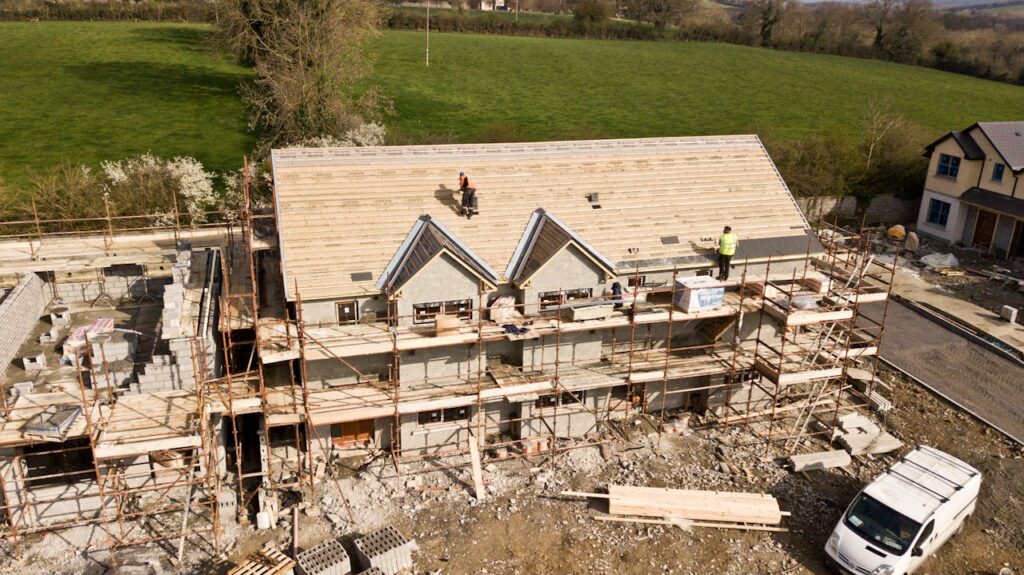Did you know that 90% of all millionaires have built their wealth, at least partly, through real estate investing?
An investment property can be a powerful tool in securing your financial future. Unlike the stock market, where prices can swing by over 40% in a single year, real estate provides a stable, recurring income backed by an asset you directly control.
And if you’re still not convinced that a rental property can help you build wealth, just look at the example that history has set for us: Owning property – and owning land – is one of the most surefire ways for humans across cultures to become rich.
You provide shelter, and someone else pays you for it. It’s that simple. From ancient empires to modern investors, real estate has proven to be a timeless wealth-building strategy.
Today, it can be the foundation of your financial security and a legacy of wealth for future generations.
Understanding Real Estate Investing
What Is Real Estate Investing?
Real estate investing involves the buying, owning, managing, and eventually the selling of properties to generate income or profit.
Depending on the strategy involved, it can offer both short-term cash flow and long-term appreciation.
You can invest in real estate through direct property ownership or through real estate investment trusts (REITS).
Each approach offers unique benefits, allowing you to select what best fits your goals and lifestyle – but direct ownership over the asset is the most lucrative strategy, which is something that we’ll review in more detail in a little bit.
Why Invest in Real Estate?
As of October 2024, the United States faces a significant housing shortage. Estimates suggest 4.5 to 6.8 million more homes are needed in order to meet current demand.
Regardless of the exact figure: Houses are in high-demand – and builders have simply not been able to build fast enough to meet this demand, even before the pandemic.
The good news for rental property investors is that this high demand also extends to rental properties. According to the National Low Income Housing Coalition, no state has enough rental property supply. Not everyone has the resources to maintain a property, making it essential for landlords to provide well-maintained housing options.
So why invest in real estate? One word: Demand. Well, and stability. Okay, maybe two words.
Real estate is a high-demand industry with strong potential for returns. While a downturn is always possible, it’s unlikely given the ongoing shortage of housing. And, unfortunately for those who aren’t in a position to own property, it doesn’t appear that the trend is reversing. Builders still have their hands tied when it comes to development, making it too risky and unprofitable in many areas of the United States.
Therefore, with rental properties in constant demand, real estate is a stable investment that could offer you returns far in excess of what you might see in other industries.
The stability of investment properties comes mainly from a long-term perspective. Real estate tends to appreciate over decades due to things like the physical asset value, income generation, and potential tax benefits despite short-term fluctuations. Particularly, rental investing can provide steady monthly cash flow, and rents do tend to rise with inflation, providing a natural hedge. More on this below.

Benefits of Real Estate Investing
An investment property can absolutely secure your financial future—and it comes with a lot of perks. From steady rental income that adds cash flow each month to long-term appreciation that helps grow your wealth over time, rental property investing is packed with benefits.
Here are a few of the most significant:
- Steady Income Stream: Real estate investing offers ongoing income through rental properties, providing a stable, recurring cash flow. This is especially important for retirees or those on a fixed income. If you’re a successful business owner but don’t like the ebbs and flows of your income, this can be a way to even out the bumps. Property flipping can also yield high returns in a shorter timeframe by buying low, renovating, and selling at a higher price.
- Long-Term Appreciation: Properties tend to appreciate over time, allowing investors to build equity and achieve significant returns upon sale. This is especially important during an inflationary period (like the one we’re in today). Houses tend to match or slightly exceed inflation. From 1968 to 2009, the average appreciation rate for existing homes was 5.4% per year, outpacing inflation by roughly 80 basis points. Real estate often appreciates steadily, making it a reliable wealth-building tool.
- Tax Advantages: Investors can benefit from deductions for expenses like mortgage interest, property taxes, and depreciation, reducing the overall tax burden and helping to retain more earnings. These benefits can usually offset most (or all) of the income from the property itself.
- Hedge Against Inflation: As we mentioned above, when inflation rises, so do property values and rental income, allowing real estate to serve as a hedge that protects purchasing power and can help sustain or grow income.
Risks of Real Estate Investing
While there are certainly substantial benefits to owning an investment property, nothing is without downsides.
Here are some of the most common and pernicious risks of real estate investing:
- Illiquidity: Real estate is less liquid than other assets like stocks or bonds. It can take time to sell a property, which may be a challenge in times of financial need. On the other hand, a 401(k) or IRA that can’t be accessed without incurring major penalties until you’re 60 (or older) is also very illiquid, so this is a characteristic that real estate shares with many other investments.
- Upfront Capital and Ongoing Expenses: Real estate often requires significant initial investment and ongoing costs for maintenance, property management, and repairs, all of which can impact profitability.
- Additional Risks: Real estate investments carry risks such as tenant vacancies, property damage, and market changes. These factors can affect cash flow and property value and may require active management and resources.
- Market Fluctuations: Property values and rental income can decline during economic downturns, impacting returns. Unexpected market shifts can lead to lower property values and increased vacancies. However, real estate in the US only ever declined once in the past 150 years,
Investing in Properties
Investing in properties can be a fantastic way to build wealth and secure your financial future. Whether you’re considering buying your first rental, flipping a fixer-upper, or building something entirely new, real estate offers a wide range of opportunities to suit different goals and comfort levels.
The beauty of property investing is that it’s flexible — you can choose a strategy that fits your lifestyle, budget, and long-term plans.
Investing in Your Own Home
Investing in your own home can be a foundation for financial security, offering both a place to live and an asset that appreciates over time.
According to this study, homeowners’ wealth is 40x greater than that of renters. While correlation isn’t causation, many homeowners benefit from the fact that owning their own property is a lot like a forced savings account.
Owning a home can also provide significant tax benefits, such as deductions for mortgage interest and property taxes, helping to reduce your annual tax burden – however, since many will maximize their tax return by opting for the standard deduction, this may not apply to everyone. Always consult your CPA to determine if this is the right choice for you.

Investing in Rental Properties
Investing in rental properties can generate a steady income stream through monthly rent, providing a potentially consistent cash flow. Rental property investment offers tax advantages that often beat those offered by a primary residence since the rental property owner can deduct operating and owner expenses and depreciation.
As is the case with all properties, over time, the property can appreciate, allowing investors to build equity and realize gains upon sale.
Additionally, it’s possible to invest in rental properties with little to no money down by using DSCR loans. We have a full guide to DSCR loans available here, but the gist is that you can use a property’s potential income as a way to qualify for the mortgage.
Flipping Properties
There’s a reason why there are so many popular home renovation shows on television: It can be a very lucrative and rewarding investment.
Property flipping involves buying a property, often in need of renovations, with the goal of selling it quickly at a profit. This strategy can offer high returns, especially when property values are rising.
As we mentioned in the beginning, houses are in high demand. Home flippers can take houses that people would otherwise not want to buy due to the level of deferred maintenance, fix them up, provide society with another much-needed home, and make a bundle.
If you’re interested in getting into flipping properties, we have a “Complete Guide to Fix-and-Flip” loans that you should check out. If you’re a more experienced investor who is in need of financing, schedule a call with us and we’d be happy to tell you more about the terms.
Building from the Ground Up
Building a new investment property from the ground up allows investors complete control over design, layout, and materials, making it ideal for those seeking a customized investment property.
This approach often results in a property with the latest energy-efficient features and lower maintenance costs, potentially increasing its appeal to tenants or buyers.
However, new construction requires substantial upfront capital, along with securing the right permits, hiring contractors, and managing the building process. The timeframe to completion can be longer than other real estate investments, and construction costs can exceed the budget if materials or labor prices increase unexpectedly. Many investors utilize construction loans, which cover the project costs and can be rolled into a long-term mortgage upon completion.

Things to Consider Before Buying an Investment Property
Investing in real estate can be rewarding, but there are important factors to consider before diving in. A well-planned approach can maximize returns and reduce potential risks.
Lucky for you, we’ve helped dozens of real estate investors get their start in real estate and start building their empires – so we know a thing or two about rental property investing for beginners.
Financial Goals and Budgeting
Start by establishing clear financial goals: Are you looking for a steady cash flow, long-term appreciation, or perhaps a combination of both? Setting these objectives upfront will help you assess the type of property that aligns with your goals, whether it’s a single-family rental, multifamily property, or a short-term rental.
Additionally, rental property investing doesn’t always entail buying and holding the property for a long time. Our fix-and-flip loans can help you make a short-term profit on an asset that’s steadily growing over time.
Budgeting for the upfront costs is equally essential. Aside from the down payment, consider ongoing expenses, including property taxes, insurance, maintenance, property management fees, and potential repairs. Unexpected expenses can impact cash flow, so maintaining a financial cushion is wise. Planning for the long term — evaluating potential appreciation, projected rental income growth, and market trends — will help align your investment with your financial goals.
Researching and Choosing Investment Options
Real estate offers several investment options, each with unique benefits and risks. Direct property ownership offers the most control and potential for high returns, but it requires active management. REITs (Real Estate Investment Trusts) allow investors to invest in a portfolio of properties without the need for hands-on management, offering a more passive way to benefit from real estate. Crowdfunding platforms offer another avenue for passive real estate investments, typically requiring lower initial capital, which can be ideal for those looking to diversify without the responsibility of direct property ownership.
Consider your time commitment, risk tolerance, and the level of control you want. Each option comes with varying degrees of return potential, so it’s essential to choose the approach that best suits your personal circumstances and financial goals.
Diversifying
Diversification spreads risk across different investments, reducing the impact if one asset underperforms. In real estate, this can mean diversifying by property type (residential vs. commercial), location, or investment strategy (buy-and-hold, short-term rental, or flipping). A diverse portfolio provides a safety net if one area of the market takes a downturn.
For example, owning both residential rentals and commercial properties in different regions can create balance; when one market fluctuates, the other might remain stable. Diversification also allows investors to take advantage of different growth cycles across asset types, providing both steady cash flow and potential appreciation.

Ready to start your real estate investing journey?
Real estate investing offers an excellent pathway to building wealth, providing steady cash flow, long-term appreciation, and tax benefits. Whether you’re starting with your own home, a rental property, or diversifying into commercial real estate, a solid understanding of your goals, financing, and market trends will set you on the right path.
If you’re interested in learning more or want to explore financing options, book a call with Defy today to discuss how we can help you achieve your real estate investing goals!
Investment Property FAQs:
What is an investment property and how does it differ from a primary residence?
An investment property is a real estate asset purchased to generate rental income or profit from appreciation, whereas a primary residence is a home where you live. Investment properties are often subject to different financing rules and tax treatments.
What are the key benefits of owning an investment property for financial security?
Owning an investment property can provide steady rental income, potential long-term appreciation, and tax advantages, making it an effective way to build financial security and a legacy of wealth.
How do I finance my first investment property?
You can finance your first investment property through traditional mortgages, DSCR loans, or other specialized financing options. It’s essential to choose a financing method that aligns with your investment goals and risk tolerance.
What should I look for when choosing an investment property to buy?
Look for properties in locations with strong rental demand, good economic indicators, and appreciating markets. Consider property type, expected rental income, maintenance costs, and local regulations.
How does owning an investment property create passive income?
An investment property generates passive income through rent payments, which provides cash flow without daily active management if you hire a property manager.
What are the tax advantages of owning an investment property?
Investment property owners can benefit from deductions for mortgage interest, property taxes, depreciation, and operating expenses, which can significantly reduce taxable income.
What are the risks associated with investing in an investment property, and how can I mitigate them?
Risks include property value fluctuations, tenant vacancies, and unexpected repairs. You can mitigate these risks by maintaining an emergency fund, thoroughly vetting tenants, and diversifying your investment portfolio.
How can I maximize the return on my investment property?
To maximize your return, focus on choosing properties in high-demand areas, making cost-effective upgrades to increase rental value, and keeping occupancy rates high. Effective property management and proactive maintenance can also improve profitability.
Should I manage the property myself or hire a property manager?
This depends on your availability, expertise, and comfort level. Managing the property yourself can save costs but requires time and effort. Hiring a property manager can help ensure everything runs smoothly without requiring your constant attention, especially if you have multiple properties or live far from your investment.




